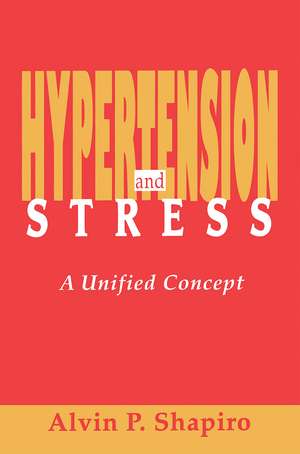Hypertension and Stress: A Unified Concept
Autor Alvin P. Shapiroen Limba Engleză Paperback – 30 sep 2021
A constant awareness has been present that emotional stress, both from within the individual as well as from environmental sources, plays a role in the "three Ps" -- predisposition, precipitation, and perpetuation -- of hypertension. Arguments range from stating that such stress may be the major cause of at least some forms of hypertension, to allowing that although some effect is present from stress, it is only a minor perturbation of no significance in the overall pattern of the disease. Advocates of stress theory may be biased by a lack of detailed knowledge or experience with the physiology and biochemistry involved in the establishment of this disorder. On the other hand, those who deny the importance of stress factors may be unaware of the large body of data that indicate the role of these factors in any comprehensive understanding of hypertension.
Following the Mosaic Theory, this book's approach to hypertension shows that multiple factors can be invoked in understanding the etiology and management of hypertension, where the strength of individual factors vary depending on genetic background, acquired diseases, and environmental influences. Stress can be involved in predisposition by affecting a genetically programmed person, in precipitation by supplying the stimulus to bring the disease to a clinical level, and in perpetuation by maintaining or exacerbating the clinical disease. This volume attempts to integrate what is known about the effects of stress on blood pressure with the overall mosaic of hypertension making use of the aforementioned "three Ps" as part of the framework for this integration.
Preț: 366.74 lei
Nou
Puncte Express: 550
Preț estimativ în valută:
70.17€ • 73.27$ • 58.08£
70.17€ • 73.27$ • 58.08£
Carte tipărită la comandă
Livrare economică 05-19 aprilie
Preluare comenzi: 021 569.72.76
Specificații
ISBN-13: 9781138992290
ISBN-10: 1138992291
Pagini: 124
Dimensiuni: 152 x 229 x 8 mm
Greutate: 0.23 kg
Ediția:1
Editura: Taylor & Francis
Colecția Psychology Press
Locul publicării:Oxford, United Kingdom
ISBN-10: 1138992291
Pagini: 124
Dimensiuni: 152 x 229 x 8 mm
Greutate: 0.23 kg
Ediția:1
Editura: Taylor & Francis
Colecția Psychology Press
Locul publicării:Oxford, United Kingdom
Public țintă
ProfessionalCuprins
Contents: Acknowledgments. Historical Considerations. Reactivity and Blood Pressure. Variability of Blood Pressure. The Hypertensive Personality: A Physiologic and Psychologic Reconciliation. Behavior and Antihypertensive Therapy. Nonpharmacological Threatment of Hypertension. Compliance with Therapy. Summary, Conclusions, and Future Goals.
Recenzii
"The writing is crisp, clear, and personal. Shapiro deals masterfully with conflicting views as to whether hypertension is a disease, a neuroregulatory behavior of arterial pressure secondary to adjustments to life experience or simply an aspect of other disorders....a thorough, well-balanced critique of what has been learned about hypertension during the past one hundred years."
—Integrative Physiological and Behavioral Science
"Dr. Shapiro has long been regarded as the most knowledgeable researcher in the Council for High Blood Pressure Research in the area of behavioral medicine as it relates to the pathogenesis, pathophysiology, and treatment of hypertensive diseases....the behavioral and neurophysiological sequences that he postulates provide a realistic and working hypothesis for the participation of stress in the overall mosaic of hypertension. It is to this point that clinicians will find this highly readable discussion meaningful in relating with patients regarding their deep-seated concerns about stress and anxieties in the expression of their hypertensive disease....Furthermore, the reasoning presented by the author also is 'must reading' for those scientists and members of the lay media who consistently attempt to search for simplistic or single explanations for the causation and treatment of disease."
—Hypertension
—Integrative Physiological and Behavioral Science
"Dr. Shapiro has long been regarded as the most knowledgeable researcher in the Council for High Blood Pressure Research in the area of behavioral medicine as it relates to the pathogenesis, pathophysiology, and treatment of hypertensive diseases....the behavioral and neurophysiological sequences that he postulates provide a realistic and working hypothesis for the participation of stress in the overall mosaic of hypertension. It is to this point that clinicians will find this highly readable discussion meaningful in relating with patients regarding their deep-seated concerns about stress and anxieties in the expression of their hypertensive disease....Furthermore, the reasoning presented by the author also is 'must reading' for those scientists and members of the lay media who consistently attempt to search for simplistic or single explanations for the causation and treatment of disease."
—Hypertension
